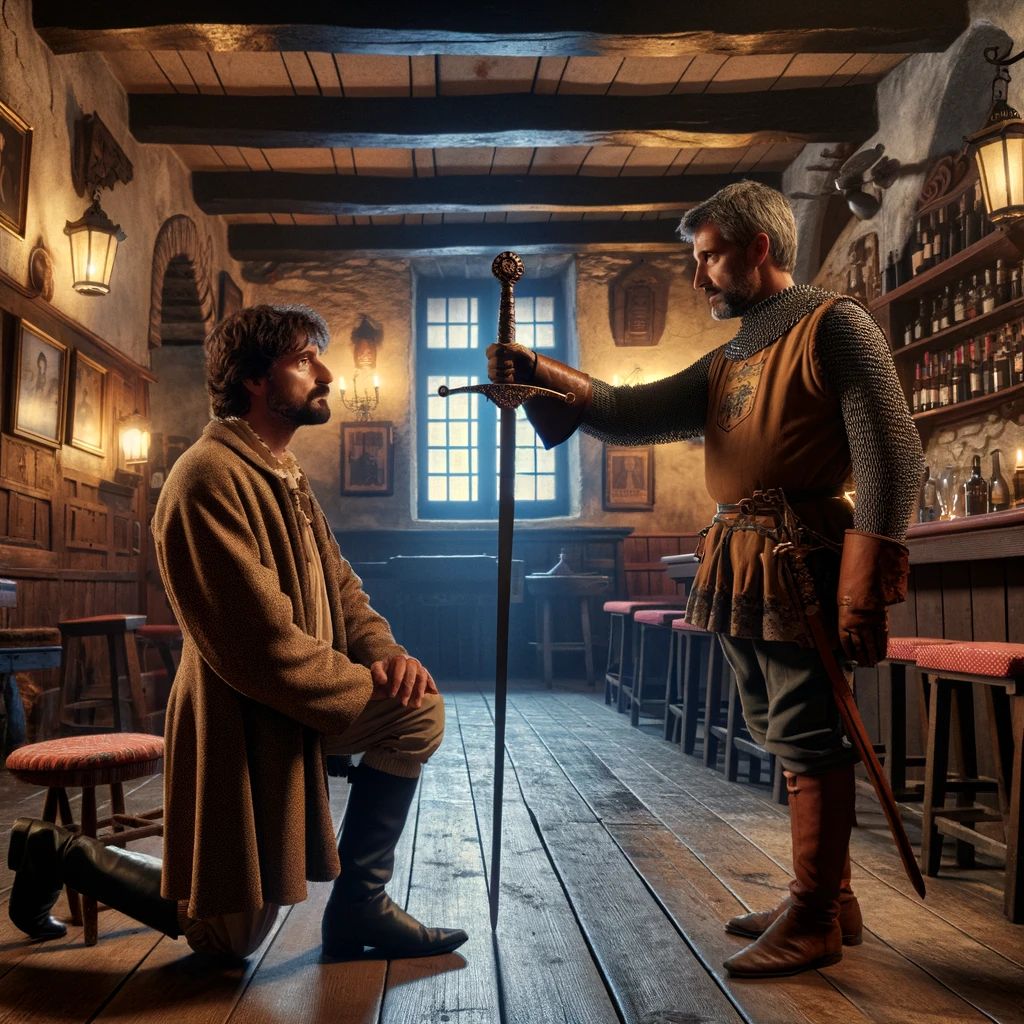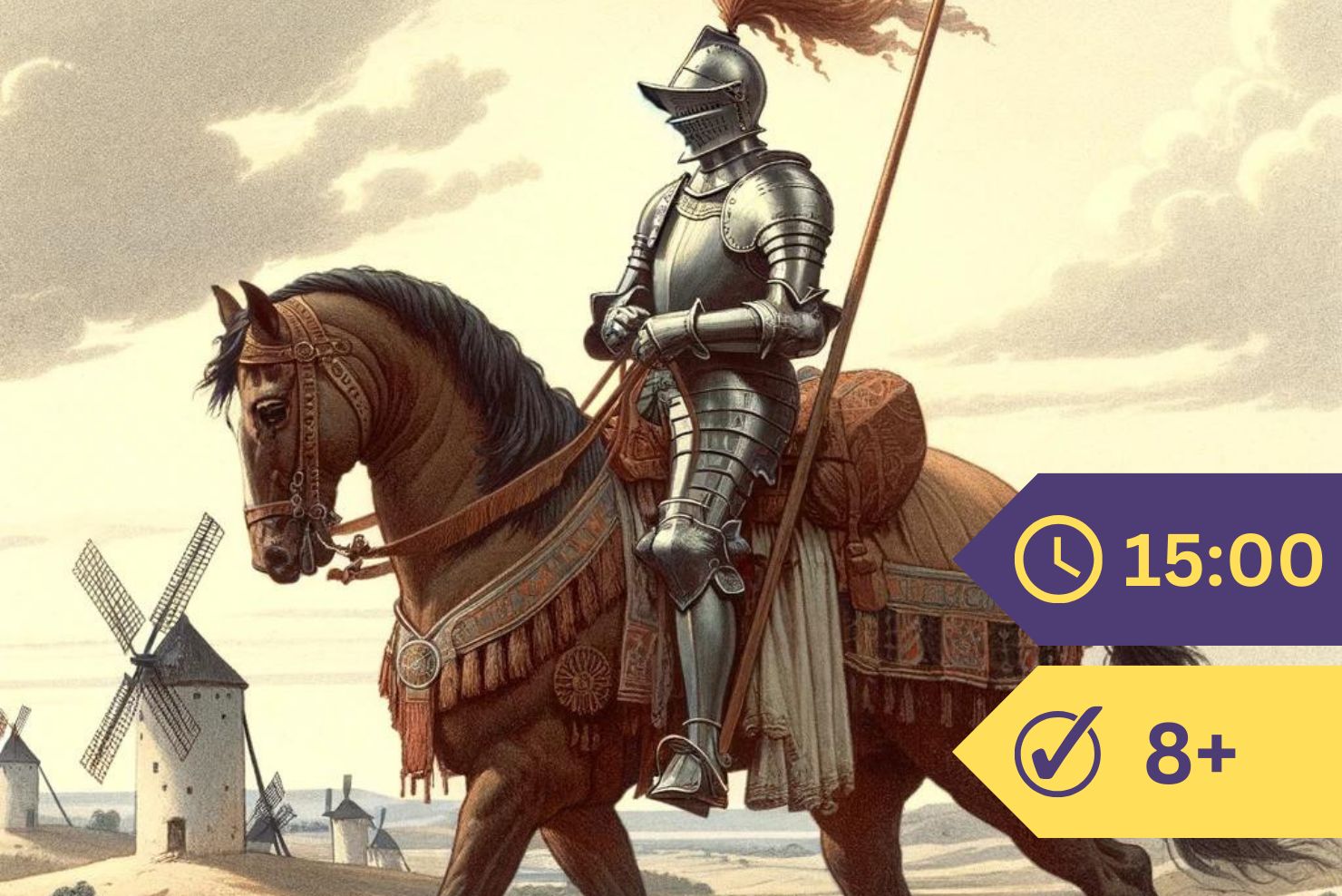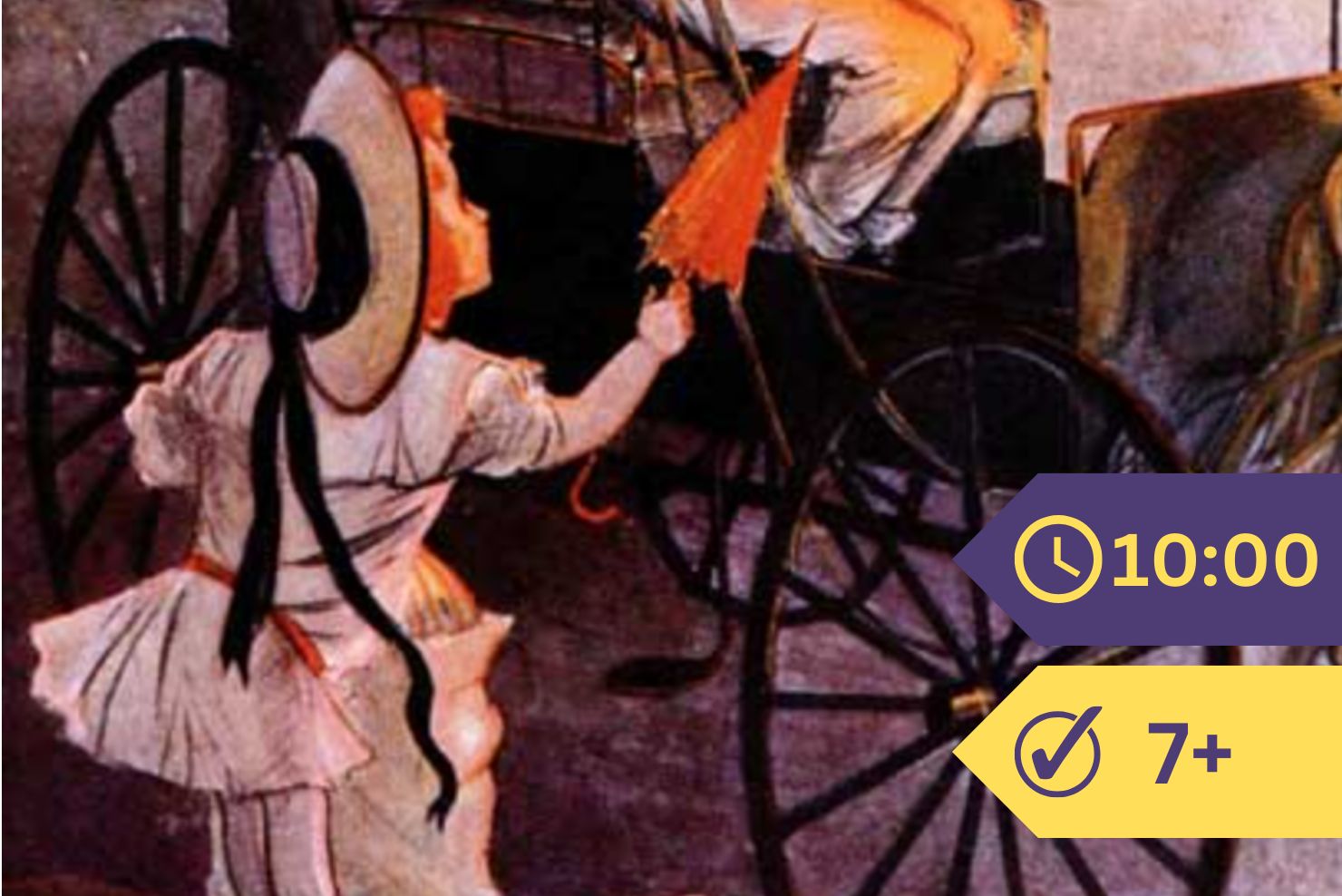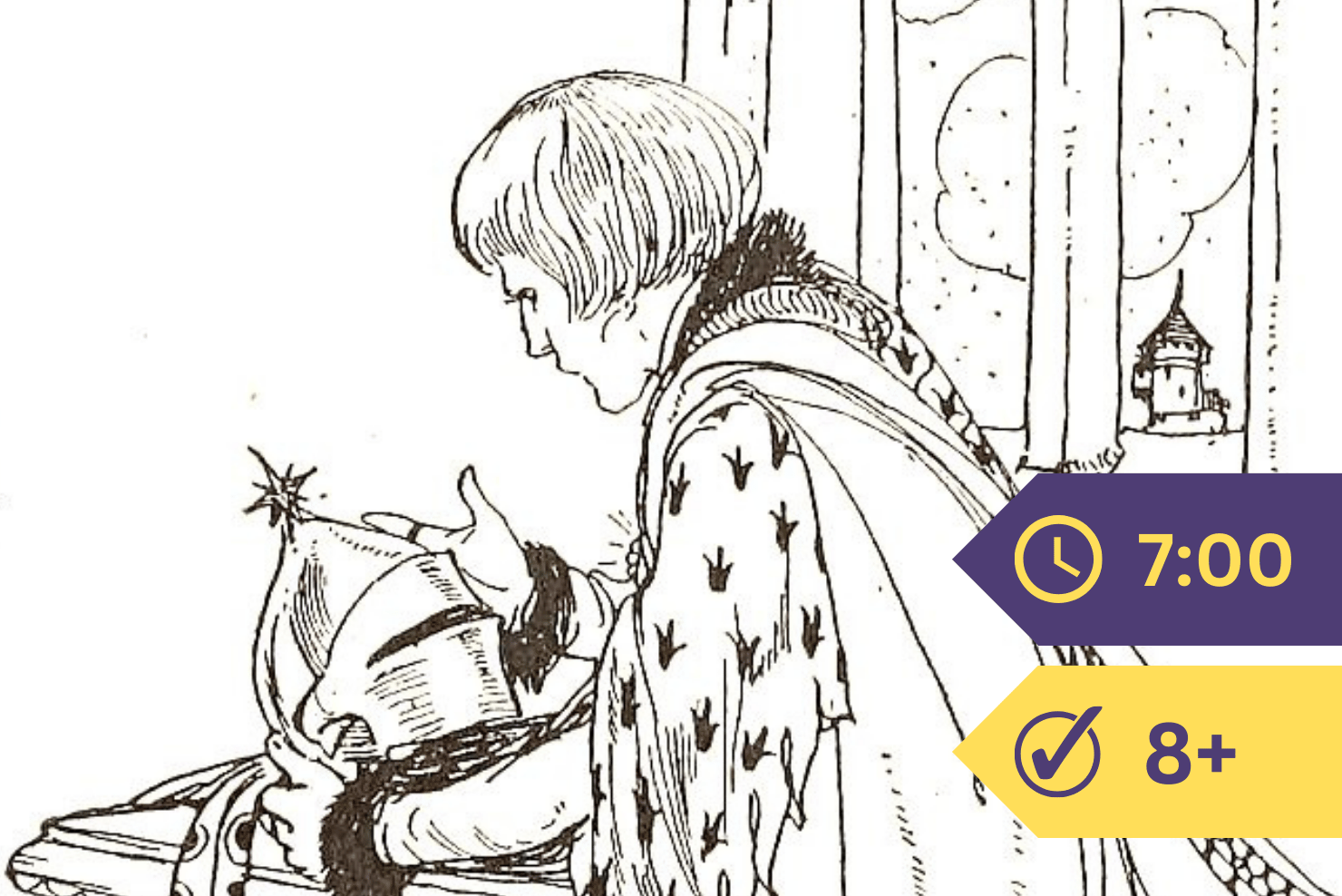When he had finished his sorry supper, he took his host with him to the stable, and shutting the door threw himself down upon his knees before him, saying: “I will never rise from this place where I am, sir constable, until your courtesy shall grant unto me a boon that I mean to demand of you, something which will add to your renown and to the profit of all the human race.”
The innkeeper, seeing his guest at his feet, and hearing him speak these words, stood confounded at the sight, not knowing what he would say or do next, and tried to make him arise. But all was in vain until he had promised him that he would grant him any gift that he sought at his hands.
“Signor,” said Don Quixote, rising from his knees, “I did never expect less from your great magnificence, and now I will tell you that the boon which I demanded of you, and which you have so generously granted, is that to-morrow in the morning you will dub me knight. This night I will watch mine armour in the chapel of your castle, and in the morning, as I have said, the rest of my desires shall be fulfilled, that I may set out in a proper manner throughout the four parts of the world to seek adventures to the benefit of the poor and: needy, as is the duty of knighthood and of knights-errant.”
The innkeeper, who was a bit of a jester, and had before thought that the wits of his guest were none of the best, was sure that his suspicions were true when he heard him speak in this manner. And in order to enjoy a joke at his expense, he resolved to fall in with his humour, and told him that there was great reason in what he desired, which was only natural and proper in a knight of such worth as he seemed to be. He added further that there was no chapel in his castle where he might watch his arms, for he had broken it down to build it up anew. But, nevertheless, he knew well that in a case of necessity they might be watched in any other place, and therefore he might watch them that night in the lower court of the castle, where in the morning he, the innkeeper, would perform all the proper ceremonies, so that he should be made not only a dubbed knight, but such a one as should not have an equal in the whole universe.
The innkeeper now gave orders that Don Quixote should watch his armour in a great yard near one side of the inn, so he gathered together all his arms, laid them on a cistern near a well, and buckling on his target he laid hold of his lance and walked up and down before the cistern very demurely, until night came down upon the scene.
In the meantime the roguish innkeeper told all the rest that lodged in the inn of the folly of his guest, the watching of his arms, and the knighthood which he expected to receive. They all wondered very much at so strange a kind of folly, and going out to behold him from a distance, they saw that sometimes he marched to and fro with a quiet gesture, other times leaning upon his lance he looked upon his armour for a good space of time without beholding any other thing save his arms.
Although it was now night, yet was the moon so clear that everything which the knight did was easily seen by all beholders. And now one of the carriers that lodged in the inn resolved to give his mules some water, and for that purpose it was necessary to move Don Quixote’s armour that lay on the cistern.
Seeing the carrier approach, Don Quixote called to him in a loud voice: “O thou, whosoever thou art, bold knight, who dares to touch the armour of the bravest adventurer that ever girded sword, look well what thou doest, and touch them not if thou meanest not to leave thy life in payment for thy meddling!”
The carrier took no notice of these words, though it were better for him if he had, but laying hold of the armour threw it piece by piece into the middle of the yard.
When Don Quixote saw this, he lifted up his eyes towards heaven, and addressing his thoughts, as it seemed, to his Lady Dulcinea, he said: “Assist me, dear lady, in this insult offered to thy vassal, and let not thy favour and protection fail me in this my first adventure!”
Uttering these and other such words, he let slip his target or shield, and lifting up his lance with both hands he gave the carrier so round a knock on his head that it threw him to the ground, and if he had caught him a second he would not have needed any surgeon to cure him. This done, he gathered up his armour again, and laying the pieces where they had been before, he began walking up and down near them with as much quietness as he did at first.
Soon afterwards another carrier, without knowing what had happened (for his companion still lay on the ground), came also to give his mules water, and started to take away the armour to get at the cistern, Don Quixote let slip again his target, and lifting his lance brought it down on the carrier’s head, which he broke in several places.
All the people in the inn, and amongst them the innkeeper, came running out when they heard the noise, and Don Quixote seeing them seized his target, and, drawing his sword, cried aloud: “O lady of all beauty, now, if ever, is the time for thee to turn the eyes of thy greatness on thy captive knight who is on the eve of so marvellous great an adventure.”
Saying this seemed to fill him with so great a courage, that if he had been assaulted by all the carriers in the universe he would not have retreated one step.
The companions of the wounded men, seeing their fellows in so evil a plight, began to rain stones on Don Quixote from a distance, who defended himself as well as he might with his target, and durst not leave the cistern lest he should appear to abandon his arms.
The innkeeper cried to them to let him alone, for he had already told them that he was mad. But Don Quixote cried out louder than the innkeeper, calling them all disloyal men and traitors, and that the lord of the castle was a treacherous and bad knight to allow them to use a knight-errant so basely; and if he had only received the order of knighthood he would have punished him soundly for his treason. Then calling to the carriers he said: “As for you, base and rascally ruffians, you are beneath my notice. Throw at me, approach, draw near and do me all the hurt you may, for you shall ere long receive the reward of your insolence.”
These words, which he spoke with great spirit and boldness, struck a terrible fear into all those who assaulted him, and, partly moved by his threats and partly persuaded by the innkeeper, they left off throwing stones at him, and he allowed them to carry away the wounded men, while he returned to his watch with great quietness and gravity.
The innkeeper did not very much like Don Quixote’s pranks, and therefore determined to shorten the ceremony and give him the order of knighthood at once before any one else was injured. Approaching him, therefore, he made apologies for the insolence of the base fellows who had thrown stones at him, and explained that it was not with his consent, and that he thought them well punished for their impudence. He added that it was not necessary for Don Quixote to watch his armour any more, because the chief point of being knighted was to receive the stroke of the sword on the neck and shoulder, and that ceremony he was ready to perform at once.
All this Don Quixote readily believed, and answered that he was most eager to obey him, and requested him to finish everything as speedily as possible. For, he said, as soon as he was knighted, if he was assaulted again, he intended not to leave one person alive in all the castle, except those which the constable should command, whom he would spare for his sake.
The innkeeper, alarmed at what he said, and fearing lest he should carry out his threat, set about the ceremony without delay. He brought out his day-book, in which he wrote down the accounts of the hay and straw which he sold to carriers who came to the inn, and attended by a small boy holding the end of a candle and walking before him, and followed by the two women who were staying at the inn, he approached Don Quixote, He solemnly commanded him to kneel upon his knees, while he mumbled something which he pretended to read out of the book that he held in his hand. Then he gave him a good blow on the neck, and after that another sound thwack over the shoulders with his own sword, always as he did so continuing to mumble and murmur as though he were reading something out of his book. This being done, he commanded one of the damsels to gird on his sword, which she did with much grace and cleverness. And it was with difficulty that they all kept from laughing during this absurd ceremony, but what they had already seen of Don Quixote’s fury made them careful not to annoy him even by a smile.
When she had girded on his sword, the damsel said: “May you be a fortunate knight, and meet with good success in all your adventures.”
Don Quixote asked her how she was called, that he might know to whom he was obliged for the favours he had received. She answered with great humility that she was named Tolosa, and was a butcher’s daughter of Toledo. Don Quixote replied requesting her to call herself from henceforth the Lady Tolosa, which she promised to perform. The other damsel buckled on his spurs, and when Don Quixote asked her name she told him it was Molinera, and that she was daughter of an honest miller of Antequera. Don Quixote entreated her also to call herself Lady Molinera, and offered her new services and favours.
These strange and never-before-seen ceremonies being ended, Don Quixote could not rest until he was mounted on horseback that he might go to seek adventures. He therefore caused Rozinante to be instantly saddled, leaped on his back, and embracing the innkeeper, thanked him in a thousand wild and ridiculous ways for the great favour he had done him in dubbing him knight. The innkeeper, who was only eager to be rid of him without delay, answered him in the same fashion, and let him march off without demanding from him a single farthing for his food or lodging.







